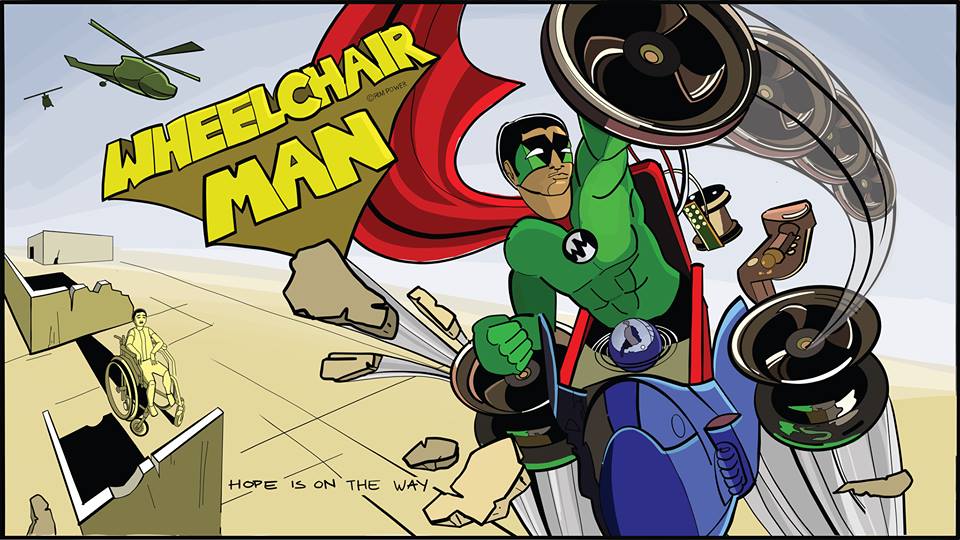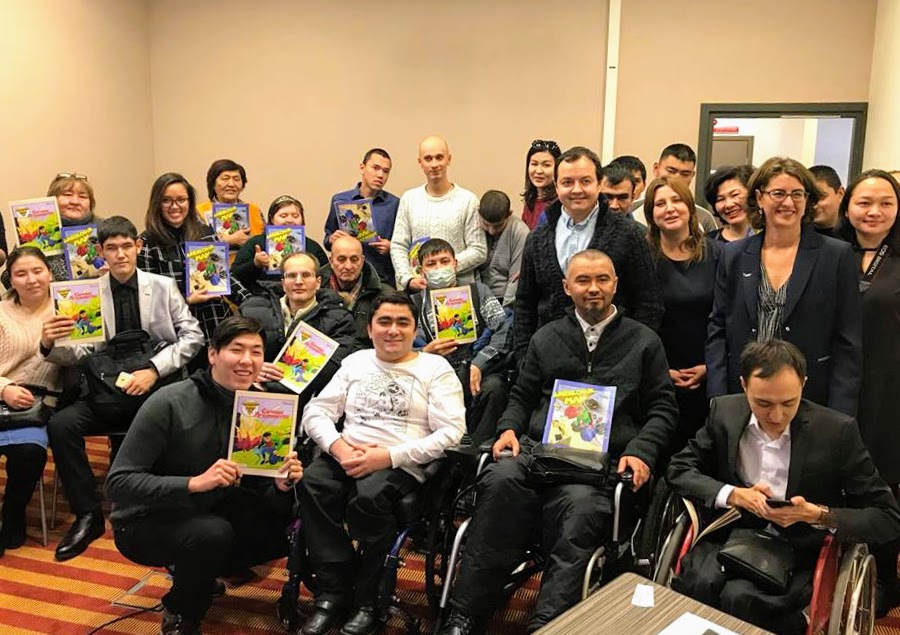ASTANA – U.S.-based motivator and activist for people with physical challenges Mohammad Sayed presented Nov. 26 in Astana the comic book he created about a man in a wheelchair.
“The important thing I want people to get out of this presentation is no matter what kind of disability we have, what part of the world we are from, we all face challenges… and go through difficulties. But the important thing is we should never give up, we should be hopeful and work hard to achieve our dreams like everybody else,” said Sayed.
Sayed was born in Afghanistan in a family with two brothers and a sister. His mother died when he was five and two weeks later, he was paralyzed when his house was bombed. His father took him to the hospital and Sayed never saw him again. He lived for seven years in the hospital run by a non-governmental organisation in the Panshir Valley.
“From that age, I was on my own and I lived in this hospital in the mountains… Since I had no family to take me home, they [hospital staff] gave me a place to stay and I started to go to school to get an education… I started a small business fixing and repairing cell phones… to make enough money to pay for the school, food and clothing,” said Sayed.
He also made friends with some of the people at the hospital.
“Because the hospital was run by foreigners, there was an American doctor who came there to help people, victims of war. I met him. He wanted to learn to speak [Farsi] and he taught English to me… He became my doctor and over time, we really bonded,” said Sayed.
After seven years of life in the hospital, he had to find a new way to survive, as the hospital had to close.
“After seven years, when life was getting on the right path, an Italian journalist was kidnapped. Since the hospital was Italian, they decided to shut it down and everybody left. Once again, I was on my own. I had to figure out again [how] to survive… During the time I was living there, one doctor gave me a camera and the other gave me a printer, so I started a photography business,” said Sayed.
The American doctor Sayed had befriended was back in the United States and asked a nurse going to Afghanistan to check on Sayed’s condition after the closing of the hospital. In 2009, the nurse invited Sayed to move to the United States and began a new life.
“In 2009, she asked me if I wanted to go to America with her and be her family… and I agreed… She is now my mother. I live with her and we have two birds… I have a family,” said Sayed.
After arriving in the United States, Sayed endured several surgeries over six months.
“My condition was really bad. I had a lot of different issues. My spine was really curved. Actually, doctors told me if I did not come to America, I would have been dead by the age of 18. Right when I arrived, I went into six months of intensive surgeries. They straightened my spine and legs… Then after I recovered, I started school in America,” said Sayed.
Today he creates comic characters to inspire people in wheelchairs to think and feel different about themselves, and to challenge the society’s perception about people with disabilities as well. For Sayed, people with disabilities are heroes because they face difficulties and challenges every day.
“In America, we have a lot of superheroes: Superman, Spiderman, Batman and others. But there was nobody that represented disabled community. I went to Boston Comic Con and saw everybody in costumes. Nobody showed a sign that people with disabilities could be superheroes too. So, the first thing we did was we wanted to create five original superheroes, which are Wheelchair Man, Wheelchair Woman, Wheelchair Girl, Wheelchair Boy and Captain Afghanistan. We want them to be not only diverse in disability, but also in gender, race and ethnicity,” explained Sayed.
His goal is also to draw the attention of people all over the world to the abilities of those who live and move in wheelchairs. After starting his company, Sayed’s activities expanded.
“In 2017, we launched Wheelchair Man and it really made headlines… We started to collaborate with different organisations around the world. I was just an inventor and once it started to make news, I was pulled into different directions, like now, advocacy and travelling around the world sharing my story. I started to create next comic books. In 2018, we launched Captain Afghanistan, which is based on my best friend’s story who lost his leg and an eye. When I left Afghanistan, he was unfortunately living in the streets. He was my hero and I was his. This was my way of honouring him in his memory,” said Sayed.
The Sayed’s next comic book will be about a woman in a wheelchair from India. For that, he wants to travel to India in 2019 and find a role model for the book’s character.
“The storyline is that she was paralysed, and her parents took her to a facility and left her there. She started to go to school. After graduating she started to give back to her community by fighting for equality for girls in India,” added Sayed.
The reason Sayed chooses to share his ideas and thoughts through comic books is that, for him, this is a good way to reach out to young generation. He believes he can influence and change the mentality of people through his works.
“The goal for anybody in any part of the world is to accept us in community and see that we have a lot to give to the community… Changes do not happen overnight. We are not alone fighting for equality, justice and being involved in the community. It will be a long road ahead, but it doesn’t mean we shouldn’t fight for that,” noted Sayed.
Wanting to convey his message about hope and the empowerment of people with disabilities around the world, Sayed is now focusing his creative talents on helping others with spinal cord injuries through the development of adaptive tools.
“Since I had this creative mind, I always wanted to invent and solve problems. Along with my high school education I started to take courses at MIT and Harvard to get different skills, because I wanted to start creating different tools to not only help people physically, but also psychologically. In 2016, I graduated from high school and founded my first company to bring my visions to life. During that time, when I was creating these assistive devices, U.S. President Barack Obama … heard that I use 3D technologies and invited me to the White House,” said Sayed.
For Sayed, that was a huge motivation.
The Astana event presenting his latest comic book was organised by the Rights of Persons with Disabilities Commission named after Kairat Imanaliev in cooperation with the U.S. Embassy. Sayed will also visit Almaty and Shymkent cities.


